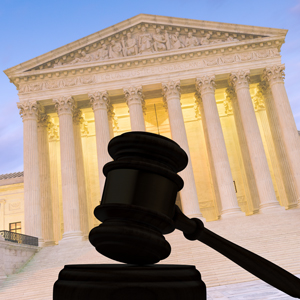
Aug. 7, 2024 – It’s a standard Hollywood scene: the eleventh-hour phone call to a U.S. Supreme Court justice, placed by a desperate attorney or prison official, frantic to halt the execution of a prisoner whose guilt has suddenly been called into doubt by new evidence.
The reality of an application for a stay of execution is usually more prosaic. This article examines statistics on the death penalty and looks at two recent stays of execution granted by the U.S. Supreme Court.
Death Penalty Statistics
The death penalty is law in the following 27 states: Alabama; Arizona; Arkansas; California; Florida; Georgia; Idaho; Indiana; Kansas; Kentucky; Louisiana; Mississippi; Missouri; Montana; Nebraska; Nevada; North Carolina; Ohio; Oklahoma; Oregon; Pennsylvania; South Carolina; South Dakota; Tennessee; Texas; Utah; and Wyoming.
 Jeff M. Brown, Willamette Univ. School of Law 1997, is a legal writer for the State Bar of Wisconsin, Madison. He can be reached by
email or by phone at (608) 250-6126.
Jeff M. Brown, Willamette Univ. School of Law 1997, is a legal writer for the State Bar of Wisconsin, Madison. He can be reached by
email or by phone at (608) 250-6126.
However, in the following states, executions have been put on hold by the governor or attorney general: Arizona; California; Ohio; Oregon; Pennsylvania; and Tennessee.
The following 23 states don’t impose the death penalty: Alaska; Colorado; Connecticut; Delaware; Hawaii; Illinois; Iowa; Maine; Maryland; Massachusetts; Michigan; Minnesota; New Hampshire; New Jersey; New Mexico; New York; North Dakota; Rhode Island; Vermont; Virginia; Washington; West Virgina; and Wisconsin.
Wisconsin abolished the death penatly in 1853. It was the first state to do so.
According to the
Death Penalty Information Center, only five states carried out executions in 2023: Alabama; Florida; Texas; Missouri; and Oklahoma. Only seven states handed down death penalty sentences in 2023.
The total number of death sentences handed down in 2023 was 21, down from a high of 315 in 1996, and 2023 was the ninth year in a row with fewer than 30 executions nationwide. Twenty-four prisoners were executed by states in 2023 – six in Florida.
Executions under the federal government’s death penalty have also been on hold since July 1, 2021.
U.S. Attorney General Merrick Garland paused federal executions pending a review of the U.S. Department of Justice’s policies and procedures related to imposition of the death penalty.
Three prisoners facing the death penalty were exonerated in 2023. That brings the total number of death row prisoners exonerated in the modern era to 195.
Most litigation over the death penalty involves state laws. The federal government has rarely imposed the death penalty after Congress reinstated the federal death penalty in 2003.
Seeking DNA Evidence
Ruben Guiterrez was sentenced to die in Texas for the 1998 murder of an 85-year-old woman. Guiterrez had long sought to obtain physical evidence, including scrapings from under the victim’s fingernails, to test the evidence for DNA.
Texas state courts turned Guiterrez down. But in 2021, a federal district court ruled that the Texas law on post-conviction DNA testing violates a prisoner’s right to due process under the Fourteenth Amendment.
The U.S. Court of Appeals for the Fifth Circuit overturned that decision in 2023 and held that Guiterrez lacked standing. The U.S. Supreme Court stayed Guiterrez’s execution with a short, unsigned
order on July 16.
According to
SCOTUSblog, the procedural posture of Guiterrez’s case is typical of Supreme Court stays of execution: a prisoner asks the Supreme Court to stay the execution while he or she pursues a habeas corpus petition.
A stay of execution must be filed with the Supreme Court justice assigned to review applications from the U.S. Court of Appeals in which the prisoner’s case began.
However, it’s long been customary for the assigned justice to refer the application for stay to the entire court, where a majority of five votes is required to grant a stay.

Learn more about recent significant U.S. Supreme Court decisions in 2024. This 4.5 CLE program from State Bar of Wisconsin PINNACLE® is available via webcast on specific dates August through November.
Visit
WisBar's Marketplace for more information and to reserve your spot.
Religious Liberty
Between July 2020 and January 2021, the Supreme Court turned down 13 applications for stays of execution.
Then, in February 2021, the Supreme Court granted an application for a stay of execution filed by Willie B. Smith. Smith argued that the refusal by Alabama prison officials to allow his pastor to be present when he was put to death violated his religious free exercise rights under the First Amendment.
In federal district court, Smith obtained an injunction against the execution. But the U.S. Court of Appeals for the Eleventh Circuit reversed the district court, prompting Smith’s application for stay with the Supreme Court.
Justice Elena Kagan wrote a concurrence, joined by Justice Sonia Sotomayor, Justice Stephen Breyer, and Justice Amy Coney Barrett. Kagan explained that prisoners have “expansive protection” for their religious liberty under the
Religious Land Use and Institutionalized Persons Act.
Justice Kagan concluded that the state’s refusal to allow Smith’s pastor to be present at the execution substantially burdened Smith’s religious liberty, and the state hadn’t shown that the burden was narrowly tailored to advance a compelling state interest.
“Prison security is, of course, a compelling state interest,” Kagan wrote. “But past practice, in Alabama and elsewhere, shows that a prison may ensure security without barring all clergy members from the execution chamber.”
Justice Brett Kavanaugh dissented, joined by Chief Justice John Roberts.
Kavanaugh wrote that, given the Supreme Court’s decision, states best find ways to allow spiritual advisors to attend executions.
“Doing so would not only satisfy inmates’ requests, but also would avoid still further delays and bring long overdue closure for victims’ families,” Justice Kavanaugh wrote.
The Supreme Court’s order didn’t list how Justice Neal Gorsuch and Justice Samuel Alito voted.
Justice Clarence Thomas wrote that he would have granted the State of Alabama’s motion to vacate an injunction issued by the district court.
Orderly Process
Filing an application for a stay of execution is inherently dramatic, given the life-or-death issues at play. However, those eleventh-hour filings used to vivid effect by filmmakers are largely a thing of the past.
According to SCOTUSblog, attorneys for the state and the prisoner are supposed to keep in touch with the deputy clerk of the Supreme Court who’s been assigned to handle death penalty cases.
“Today, a stay application may still come in at night and close to the time of execution,” wrote Stephen Wermiel on SCOTUSblog.
“But the court will likely be aware it is coming, and law clerks will remain at the court to handle the papers and will have a plan for discussing the request with their justices.”
